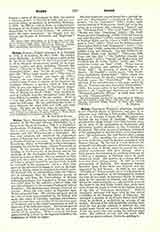

Weber, FRIEDRICH WILHELM, physician, member of the Prussian House of Deputies, and poet, b. at Alhausen, near Driburg, in Westphalia, December 25, 1813; d. at Nieheim, April 5, 1894. His father was forester for the Count of Asseburg. Weber first attended the village school, then when thirteen years old he went to the gymnasium at Paderborn, and afterwards studied medicine at the University of Greifswald. His talent for poetry had been evidenced at the gymnasium; at the university, as his biographer says, “his ballads grew like wild flowers after a spring shower”. After spending two years at Greifswald he went to Breslau, where he became acquainted with Gustav Freitag. By the end of a year, however, he returned to Greifswald, where he obtained a doctorate; thence he went to Berlin, where he passed the state medical examination with great honor. After a brief journey for recreation to southern Germany he settled as a physician at Driburg, where he spent twenty-six years. His practice as a doctor did not keep him from writing poetry. In 1887 he settled permanently at Nieheim. The numerous honors bestowed upon Weber show how beloved and distinguished he had become. In 1863 he was made “Sanitatsrat” (honorary title given to a distinguished doctor) in recognition of his distinguished medical services; he was made an honorary doctor of philosophy by the academy at Munich, and when he celebrated his semi-centennial as a physician he received the Order of the Red Eagle, fourth class, while three years before his death he received the further honor of the title of “Geheimen Sanitatsrat”. Weber’s popularity increased still more after he was elected a member of the Prussian House of Deputies. He remained a member of the Center Party until 1893, when he declined a reelection on account of his health. Because of his wide knowledge and fine character he was greatly admired in political life, and gained many friends not merely among the members of his own party, but also among his political opponents. His political activity had also much influence on his poetry without, however, spoiling it.
As poet Weber was an honor to German Catholics; the name given him “Dreizehnlinden-Weber” (Weber of the thirteen linden trees) is immortal. In three forms of poetry, the epic, lyric, and didactic, he wrote works destined to live. His early poems were frequently imitations of foreign poets, and seldom show independence; it was only in his riper years that the originality of his powers was displayed. He deserves much credit as one of the translators who made Scandinavian and English poetry accessible to Germans. His reputation, however, was founded on his epic, “Dreizehnlinden” (1878). This made Weber celebrated not only in Germany but also throughout the entire civilized world. The epic enjoyed a wide circulation and has been frequently translated, cast in a melodramatic form, and arranged for the stage. His second work, far superior in poetic value to “Dreizehnlinden”, is his “Goliath” (1892), which has been reprinted some thirty times. His “Gedichte” (1881) and “Herbstblatter” (1895), published after his death, have also been very popular. His “Marienblumen” (1885) is a proof of his manly piety. Two other religious poems written for special occasions, “Vater unser” and “Das Leiden unseres Heilandes” (1892), are less important. Weber’s latest biographer sums up his character as a man and poet thus: “In Weber fine talent and a many-sided education, nobility and purity of thought, the poet and the patriot, were all united into a personality which commanded the greatest respect”.
N. SCHEID

